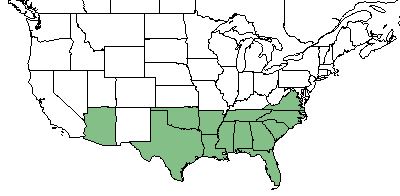Sporobolus junceus
| Sporobolus junceus | |
|---|---|

| |
| Photo by James H. Miller, USDA Forest Service, Bugwood.org hosted at Forestryimages.org | |
| Scientific classification | |
| Kingdom: | Plantae |
| Division: | Magnoliophyta - Flowering plants |
| Class: | Liliopsida - Moncots |
| Order: | Poales |
| Family: | Cyperaceae |
| Genus: | Sporobolus |
| Species: | S. junceus |
| Binomial name | |
| Sporobolus junceus (P. Beauv.) Kunth | |

| |
| Natural range of Sporobolus junceus from USDA NRCS Plants Database. | |
Common name(s): sandhills dropseed,[1] pineywoods dropseed[2]
Contents
Taxonomic Notes
Synonym(s): S. gracilis (Trinius) Merrill
Description
Sporobolus junceus is a monoecious perennial graminoid.[2]
Distribution
This species is found in southeastern Virginia, south to Florida and westward to southeastern Oklahoma and Texas.[1]
Ecology
Habitat
S. junceus is found in sandhill and other dry open areas[1], where it can become one of the more dominant grasses.[3] It appears to be rather shade tolerant since its coverage is not correlated with longleaf pine stand density.[4]
S. junceus responds negatively to soil disturbance by agriculture in South Carolina's traditionally longleaf communities.[5] It also responds negatively to agricultural-based soil disturbance in South Carolina coastal plain communities. This marks it as a possible indicator species for remnant woodland.[6] S. junceus responds negatively to soil disturbance by agriculture in Southwest Georgia.[7] It also responds negatively or not at all to soil disturbance by roller chopping in South Florida.[8] It does not respond to soil disturbance by clearcutting and chopping in North Florida flatwoods forests.[9]
Phenology
S. junceus has been observed to flower from September through November with peak inflorescence in October,[1][10], although there are reports of flowering occurring between March and June as well.[10]
Seed dispersal
This species is thought to be dispersed by gravity. [11]
Fire ecology
Burns during April, May, and July yielded larger numbers of flowers than burns at other times of the year in a Florida sandhill longleaf pine community.[3][12] After a May burn in north Florida, inflorescence and mature seeds were produced within 7-9 weeks following the fire.[12] Despite affecting flowering and seeds, an Alabama study in 2004 and 2005 showed no difference in stem densities between burned and unburned glades. These densities ranged from 1.5 to 3.4 stems m-2.[13]
Use by animals
S. junceus provides 2-5% of the diet of some terrestrial birds.[2]
Conservation and Management
Cultivation and restoration
On a central Florida sandhill, S. junceus planted in the winter established very well on overburned soils and produced the highest densities (up to 10 plants m-1 of the plants tested.[14] Seeds can be hand collected and mixed with others (e.g. wiregrass) for sowing on restoration sites.[15]
Photo Gallery
References and notes
- ↑ 1.0 1.1 1.2 1.3 Weakley A. S.(2015). Flora of the Southern and Mid-Atlantic States. Chapel Hill, NC: University of North Carolina Herbarium.
- ↑ 2.0 2.1 2.2 USDA, NRCS. (2016). The PLANTS Database (http://plants.usda.gov, 8 January 2018). National Plant Data Team, Greensboro, NC 27401-4901 USA.
- ↑ 3.0 3.1 Shepherd B. J., Miller D. L., and Thetford M. (2012). Fire season effects on flowering characteristics and germination of longleaf pine (Pinus palustris) savanna grasses. Restoration Ecology 20(2):268-276.
- ↑ Harrington T. B. (2006). Plant competition, facilitation, and other overstorey-understory interactions in longleaf pine ecosystems. In: Jose S., Jokela E. J., and Miller D. L. (eds) The longleaf pine ecosystem: ecology, silviculture, and restoration. Springer, New York, pp. 135-156.
- ↑ Brudvig, L.A. and E.I. Damchen. (2011). Land-use history, historical connectivity, and land management interact to determine longleaf pine woodland understory richness and composition. Ecography 34: 257-266.
- ↑ Brudvig, L.A., E Grman, C.W. Habeck, and J.A. Ledvina. (2013). Strong legacy of agricultural land use on soils and understory plant communities in longleaf pine woodlands. Forest Ecology and Management 310: 944-955.
- ↑ Kirkman, L.K., K.L. Coffey, R.J. Mitchell, and E.B. Moser. Ground Cover Recovery Patterns and Life-History Traits: Implications for Restoration Obstacles and Opportunities in a Species-Rich Savanna. (2004). Journal of Ecology 92(3):409-421.
- ↑ Lewis, C.E. (1970). Responses to Chopping and Rock Phosphate on South Florida Ranges. Journal of Range Management 23(4):276-282.
- ↑ Moore, W.H., B.F. Swindel, and W.S. Terry. (1982). Vegetative Response to Clearcutting and Chopping in a North Florida Flatwoods Forest. Journal of Range Management 35(2):214-218.
- ↑ 10.0 10.1 Nelson, G. PanFlora: Plant data for the eastern United States with emphasis on the Southeastern Coastal Plains, Florida, and the Florida Panhandle. www.gilnelson.com/PanFlora/ Accessed: 8 JAN 2018
- ↑ Kirkman, L. Katherine. Unpublished database of seed dispersal mode of plants found in Coastal Plain longleaf pine-grasslands of the Jones Ecological Research Center, Georgia.
- ↑ 12.0 12.1 Canfield S. L. and Tanner G. W. (1997). Observations of pineywoods dropseed (Sporobolus junceus) phenological development following fire in a sandhill community. Florida Scientist 60(2):69-72
- ↑ Duncan R. S., Anderson C. B., Sellers H. N., Robbins E. E. (2008). The effect of fire reintroduction on endemic and rare plants of a southeastern glade ecosystem. Restoration Ecology 16(1):39-49.
- ↑ Pfaff S., Maura, Jr. C., and Gonter M. A. (2001). Performance of selected Florida native species on reclaimed phosphate minelands. #96-03-120R Brooksville, FL.
- ↑ Brockway D. G., Outcalt K. W., Tomczak D. J., and Johnson E. E. (2005) Restoration of Longleaf Pine Ecosystems. United States Department of Agriculture, Forest Service, Southern Research Station, General Technical Report SRS-83.